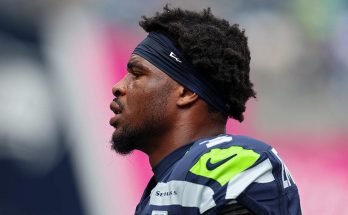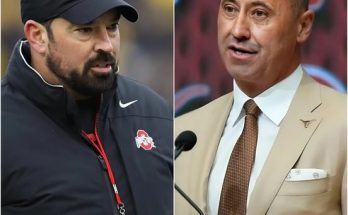LeBron James has never been one to shy away from criticism, but his response to it has often come in the form of transcendent performances, legacy-defining moments, and an unwavering focus on greatness. Yet, this time around, the Los Angeles Lakers superstar chose simplicity over spectacle. After a season filled with outside noise, speculation about his future, and endless hot takes from pundits and detractors alike, LeBron delivered a message that cut through the chatter like a knife through butter. It wasn’t shouted or delivered with venom—it was calm, controlled, and supremely confident. His pushback? A succinct reminder: “I am who I am because I never let the noise define me.”
That one statement, shared on social media and echoed in postgame interviews, sent shockwaves across the basketball world. It wasn’t just a defense—it was a declaration of truth, legacy, and longevity. At 40 years old, LeBron continues to be not just relevant, but dominant in a league he’s helped define for two decades. And yet, despite all he has accomplished—four NBA championships, four league MVPs, countless All-NBA selections—his detractors remain relentless.
They say he’s too old. They say he’s lost a step. They say he should retire. Every season, the critics find a new angle. But LeBron, as he has for 21 seasons, chooses to respond not with rage, but with results. While the Lakers faced their fair share of struggles this year, including injuries, lineup changes, and internal tension, James was once again a steady force. Averaging over 25 points, 7 rebounds, and 7 assists per game, he made the extraordinary seem routine. More importantly, he led by example—both on and off the court.
The simplicity of LeBron’s message is what made it so powerful. In an age where athletes often feel pressure to clap back with viral rants or claptrap theatrics, James chose to remind the world of his essence. His career has been built not on what others think he should be, but on what he has chosen to become. That ethos—of not letting others define your worth—resonates beyond sports. It’s why his message lit up social media, with fans and fellow athletes praising his poise and perspective.
Those who have followed LeBron from the beginning know this is nothing new. From the time he was a teenager dubbed “The Chosen One,” LeBron has been under a microscope most can’t fathom. Every move, every game, every quote has been dissected, praised, ridiculed. Through it all, he’s endured. More than that, he’s excelled. He’s grown from a high school phenom to a global icon, from a hometown hero in Akron to a father, businessman, philanthropist, and voice for change. The criticism has never ceased, but neither has his greatness.
This latest moment—a simple pushback against a chorus of haters—feels emblematic of a career spent rising above. For many, greatness isn’t just about trophies and stats. It’s about how you carry yourself when others try to tear you down. LeBron’s refusal to internalize negativity has been one of his greatest strengths. And for a player in his 40s, still logging heavy minutes, still facing off against superstars nearly half his age, that mental fortitude is as important as any physical trait.
Some critics argue that the Lakers’ recent playoff exits are evidence that LeBron’s time has passed. But this argument often ignores context. James has played more playoff games than nearly anyone in history. His basketball IQ is unmatched. And while his team may not have gone as deep as they’d hoped this season, LeBron’s performance was not the problem—it was, in fact, the reason the Lakers remained competitive. He continues to command double-teams, control the pace of games, and find ways to lead even when the odds are stacked against him.
What makes his simple message even more impactful is that it doesn’t just silence the haters—it empowers his supporters. It’s a reminder that even the most celebrated athletes deal with doubt, slander, and cynicism. What matters is how you choose to respond. For LeBron, the answer has always been to keep working, keep leading, and keep doing what he loves.
And make no mistake, LeBron still loves the game. You can see it in how he celebrates a teammate’s three-pointer, how he coaches from the bench during timeouts, and how he approaches the game with an almost childlike enthusiasm despite the years and miles on his legs. That love fuels him—and it also fuels his refusal to engage in pointless feuds or respond to every jab. As he’s often said, “I’ve got nothing left to prove.” And he’s right.
Statistically, LeBron is already the NBA’s all-time leading scorer, a record many thought would never fall. He’s top five in assists. He’s among the winningest players in postseason history. His resume is bulletproof, yet some people still try to poke holes in it. They talk rings, conveniently ignoring the teams he carried to the Finals that had no business being there. They talk about eras, overlooking how James has dominated in multiple decades and systems. They nitpick, because that’s all they can do now. His excellence has left them with no logical argument.
Still, LeBron’s response isn’t rooted in bitterness. There’s no need. He’s secure in who he is and what he’s accomplished. His message isn’t about shutting people down—it’s about standing tall in your truth. For younger players in the league, this kind of mental strength is a blueprint. For fans, it’s a lesson in grace under pressure.
Even those who don’t count themselves as LeBron fans couldn’t help but respect the clarity of his response. Because in sports, as in life, everyone faces doubters. Everyone is told what they can’t do. What separates the greats from the rest is how they process that noise. LeBron doesn’t let it control his narrative. He writes his own story—always has, always will.
The future for LeBron James is still unfolding. Whether he plays one more season or three, whether he teams up with his son Bronny or not, whether the Lakers reload or rebuild—one thing is certain. He will approach every moment with the same integrity, discipline, and passion that has defined his career. He doesn’t need a fiery press conference or a cryptic social media post to prove his point. Sometimes, just being who you are is enough.
This moment, this pushback, might not make highlight reels. It may not end up as a banner in Crypto.com Arena. But it’s vintage LeBron—elevated, composed, and bigger than the game. It’s the kind of message that endures long after the lights go out and the jerseys are hung up. And that’s what makes it so powerful.
Because long after the critics move on to their next target, long after the debates fade and the talk shows pivot to younger stars, LeBron James will remain. Not just in the record books, but in the hearts of those who saw more than just the stats. They saw a man who never backed down from expectations, never allowed negativity to break him, and always responded with poise and purpose.
He didn’t just play the game—he changed it. And with seven words—“I am who I am because…”—he reminded the world that greatness doesn’t answer to the mob. It leads, it listens, and it lasts.



